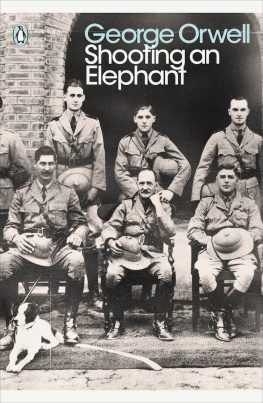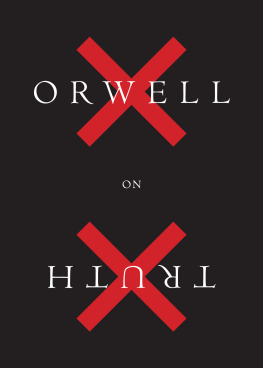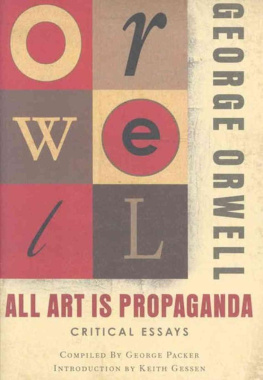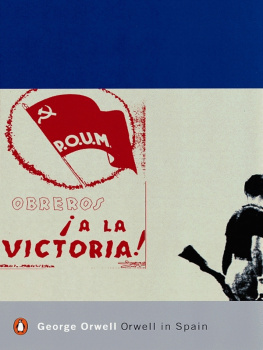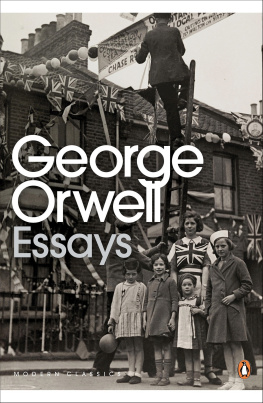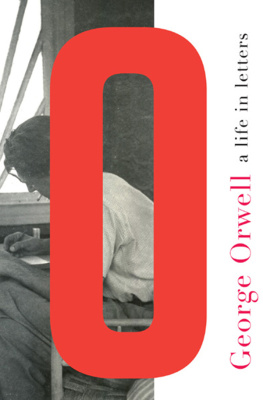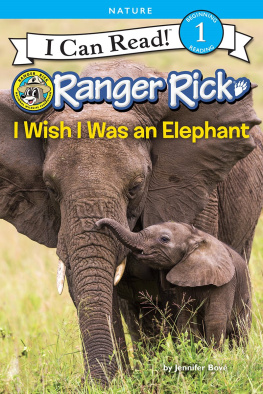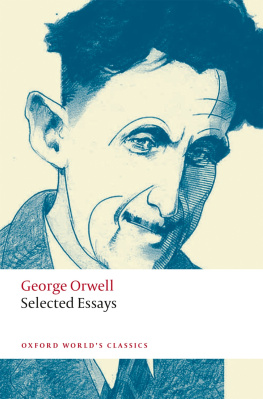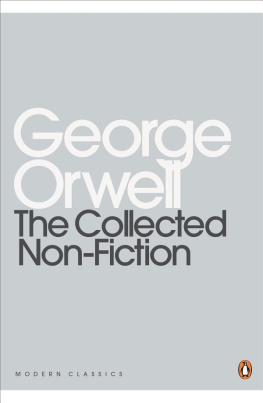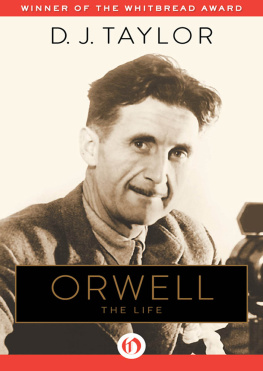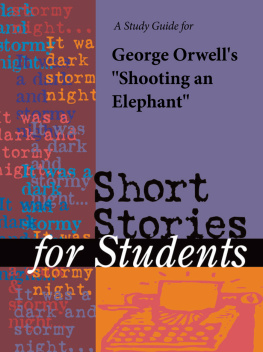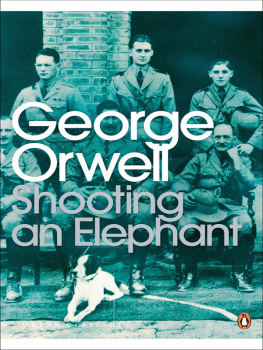PENGUIN MODERN CLASSICS
Shooting an Elephant
George Orwell (whose real name was Eric Arthur Blair) was born in 1903 in India and then went to Eton when his family moved back to England. From 1922 to 1927 he served with the Indian Imperial Police in Burma, an experience that inspired his first novel, Burmese Days (1934). He lived in Paris before returning to England, and Down and Out in Paris and London was published in 1936. After writing The Road to Wigan Pier and Homage to Catalonia (his account of fighting for the Republicans in the Spanish Civil War), Orwell was admitted to a sanatorium in 1938 and from then on was never fully fit. He spent six months in Morocco where he wrote Coming Up for Air. During the Second World War Orwell served in the Home Guard and worked for the BBC. His political allegory Animal Farm was published in 1945 and it was this novel, together with Nineteen Eighty-Four (1949), which brought him worldwide fame. George Orwell was taken seriously ill in the winter of 19489 and died in London in 1950.
Jeremy Paxman is a journalist and writer.
This poem first appeared in the Adelphi, December 1936.
Why I Write
From a very early age, perhaps the age of five or six, I knew that when I grew up I should be a writer. Between the ages of about seventeen and twenty-four I tried to abandon this idea, but I did so with the consciousness that I was outraging my true nature and that sooner or later I should have to settle down and write books.
I was the middle child of three, but there was a gap of five years on either side, and I barely saw my father before I was eight. For this and other reasons I was somewhat lonely, and I soon developed disagreeable mannerisms which made me unpopular throughout my schooldays. I had the lonely childs habit of making up stories and holding conversations with imaginary persons, and I think from the very start my literary ambitions were mixed up with the feeling of being isolated and under-valued. I knew that I had a facility with words and a power of facing unpleasant facts, and I felt that this created a sort of private world in which I could get my own back for my failure in everyday life. Nevertheless the volume of serious i.e. seriously intended writing which I produced all through my childhood and boyhood would not amount to half a dozen pages. I wrote my first poem at the age of four or five, my mother taking it down to dictation. I cannot remember anything about it except that it was about a tiger and the tiger had chair-like teeth a good enough phrase, but I fancy the poem was a plagiarism of Blakes Tiger, Tiger. At eleven, when the war of 191418 broke out, I wrote a patriotic poem which was printed in the local newspaper, as was another, two years later, on the death of Kitchener. From time to time, when I was a bit older, I wrote bad and usually unfinished nature poems in the Georgian style. I also, about twice, attempted a short story which was a ghastly failure. That was the total of the would-be serious work that I actually set down on paper during all those years.
However, throughout this time I did in a sense engage in literary activities. To begin with there was the made-to-order stuff which I produced quickly, easily and without much pleasure to myself. Apart from school work, I wrote vers doccasion, semi-comic poems which I could turn out at what now seems to me astonishing speed at fourteen I wrote a whole rhyming play, in imitation of Aristophanes, in about a week and helped to edit school magazines, both printed and in manuscript. These magazines were the most pitiful burlesque stuff that you could imagine, and I took far less trouble with them than I now would with the cheapest journalism. But side by side with all this, for fifteen years or more, I was carrying out a literary exercise of a quite different kind: this was the making up of a continuous story about myself, a sort of diary existing only in the mind. I believe this is a common habit of children and adolescents. As a very small child I used to imagine that I was, say, Robin Hood, and picture myself as the hero of thrilling adventures, but quite soon my story ceased to be narcissistic in a crude way and became more and more a mere description of what I was doing and the things I saw. For minutes at a time this kind of thing would be running through my head: He pushed the door open and entered the room. A yellow beam of sunlight, filtering through the muslin curtains, slanted on to the table, where a matchbox, half open, lay beside the inkpot. With his right hand in his pocket he moved across to the window. Down in the street a tortoiseshell cat was chasing a dead leaf, etc. etc. This habit continued till I was about twenty-five, right through my non-literary years. Although I had to search, and did search, for the right words, I seemed to be making this descriptive effort almost against my will, under a kind of compulsion from outside. The story must, I suppose, have reflected the styles of the various writers I admired at different ages, but so far as I remember it always had the same meticulous descriptive quality.
When I was about sixteen I suddenly discovered the joy of mere words, i.e. the sounds and associations of words. The lines from Paradise Lost,
So hee with difficulty and labour hard
Moved on: with difficulty and labour hee,
which do not now seem to me so very wonderful, sent shivers down my backbone; and the spelling hee for he was an added pleasure. As for the need to describe things, I knew all about it already. So it is clear what kind of books I wanted to write, in so far as I could be said to want to write books at that time. I wanted to write enormous naturalistic novels with unhappy endings, full of detailed descriptions and arresting similes, and also full of purple passages in which words were used partly for the sake of their sound. And in fact my first complete novel, Burmese Days, which I wrote when I was thirty but projected much earlier, is rather that kind of book.
I give all this background information because I do not think one can assess a writers motives without knowing something of his early development. His subject-matter will be determined by the age he lives in at least this is true in tumultuous, revolutionary ages like our own but before he ever begins to write he will have acquired an emotional attitude from which he will never completely escape. It is his job, no doubt, to discipline his temperament and avoid getting stuck at some immature stage, or in some perverse mood: but if he escapes from his early influences altogether, he will have killed his impulse to write. Putting aside the need to earn a living, I think there are four great motives for writing, at any rate for writing prose. They exist in different degrees in every writer, and in any one writer the proportions will vary from time to time, according to the atmosphere in which he is living. They are:
1. Sheer egoism. Desire to seem clever, to be talked about, to be remembered after death, to get your own back on grown-ups who snubbed you in childhood, etc. etc. It is humbug to pretend that this is not a motive, and a strong one. Writers share this characteristic with scientists, artists, politicians, lawyers, soldiers, successful businessmen in short, with the whole top crust of humanity. The great mass of human beings are not acutely selfish. After the age of about thirty they abandon individual ambition in many cases, indeed, they almost abandon the sense of being individuals at all and live chiefly for others, or are simply smothered under drudgery. But there is also the minority of gifted, wilful people who are determined to live their own lives to the end, and writers belong in this class. Serious writers, I should say, are on the whole more vain and self-centred than journalists, though less interested in money.
Next page
